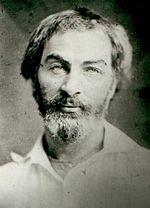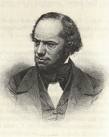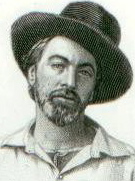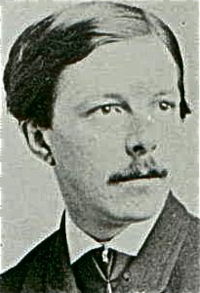Jonathan Ned Katz: "Comrades and Lovers," Act I
Copyright by Jonathan Ned Katz. All rights reserved.
Back to: Jonathan Ned Katz: "Comrades and Lovers"
- ACT I
- LIGHTS OFF; WHITMAN'S FIRST WORDS ARE HEARD IN THE DARK.
WHITMAN:
- Love thoughts
SPEAKER 1
- love-juice,
SPEAKER 2:
- love-odor,
SPEAKER 3:
- love-yielding,
SPEAKER 4:
- love-climbers,
WHITMAN:
- and the climbing sap,
SPEAKER 1:
- arms and hands of love,
SPEAKER 2:
- lips of love,
SPEAKER 3:
- phallic thumb of love,
SPEAKER 4:
- breasts of love,
WHITMAN:
- bellies pressed and glued together with love.
- LIGHTS ON, NIGHT
- SCENE TITLE, PROJECTED:
- 1 Walt Whitman, "Love-thoughts"
- THROUGHOUT THIS PIECE, PHOTOS OF THE CHARACTERS MAY BE PROJECTED.
- WHITMAN AND A "BOY" MOVE CLOSE TOGETHER, ADDRESS EACH OTHER:
BOY:
- The wet of woods through the early hours.
WHITMAN:
- Two sleepers at night lying close together as they sleep,
BOY:
- One with an arm slanting down across and below the waist of the other.
WHITMAN:
- The smell of apples,
BOY:
- aromas from crushed sage plant,
WHITMAN:
- mint,
BOY:
- birch bark.
WHITMAN:
- The boy's longings,
- the glow and pressure
- as he confides to me
- what he was dreaming.
BOY:
- The dead leaf tallings its spiral whirl,
- falling still and content to the ground.
WHITMAN:
- The sensitive, orbic, underlapped brothers,
- that only privileged feelers
- may be intimate where they are.
BOY:
- The mystic amorous night.
WHITMAN:
- The curious roamer the hand,
- roaming all over the body,
BOY:
- the bashful withdrawing of flesh
- where the fingers soothingly pause
- and edge themselves.
WHITMAN:
- The limpid liquid within the young man,
BOY:
- the vex'd corrosion
- so pensive and painful,
WHITMAN:
- the torment,
BOY:
- the irritable tide
- that will not be at rest,
WHITMAN:
- the like of the same I feel,
- the like of the same in others.
- SCENE TITLE: 2 Rufus Griswold, "Once licentiousness"
- RESPONDING TO THE EARLIER VERSE, GRISWOLD APPEARS WITH LEAVES OF GRASS, SPEAKS TO WHITMAN:
GRISWOLD:
- Once licentiousness
- shunned the light;
- now it writes books
- showing how grand and pure it is,
- and prophecies
- its own ultimate triumph.
- TO AUDIENCE, HOLDING UP LEAVES OF GRASS.
- It is impossible to imagine
- how any man's fancy
- could have conceived
- such a mass of stupid filth.
- We leave this gathering of muck
- to the laws
- which have power to suppress
- such gross obscenity.
- FIRE AND BR1MSTONE PROPHECY
- "Peccatum illud horribile,
- inter Christianos non nominandum."
- WHISPERS, THREATENINGLY, TO WHITMAN
- (That vile sin among Christians not to be named.)
- WHITMAN AND SPEAKERS RESPOND TO GRISWOLD.
- SCENE TITLE: 3 Walt Whitman, "Through me"
WHITMAN:
- Through me many long dumb voices,
SPEAKER 1:
- voices of the interminable generations of slaves,
SPEAKER 2:
- voices of prostitutes and deformed persons,
SPEAKER 3:
- voices of the diseased and despairing,
SPEAKER 4:
- voices of wombs and the fatherstuff,
SPEAKER 1:
- voices of the rights of them the others are down upon.
WHITMAN:
- Through me forbidden voices,
SPEAKER 2:
- voices of sexes and lusts,
SPEAKER 3:
- voices veiled
- and I remove the veil,
SPEAKER 4:
- voices indecent
- by me clarified and transfigured.
WHITMAN:
- I do not press my finger across my mouth!
SPEAKER 1:
- I keep as delicate around the bowels
- as around the head and heart,
SPEAKER 2:
- copulation is no more rank to me than death is.
SPEAKER 3:
- I believe in the flesh and the appetites,
SPEAKER 4:
- seeing, hearing, and feeling are miracles,
- and each part and tag of me is a miracle.
WHITMAN:
- TO BRONSON ALCOTT AND HENRY DAVID THOREAU, WHO APPEAR IN THE NEXT SCENE:
- If I worship any particular thing
- it shall be some of the spread of my body;
SPEAKER 1:
- You my rich blood,
- your milky stream pale strippings of my life;
SPEAKER 2:
- Breast that presses against other breasts
- it shall be you,
SPEAKER 3:
- Root of washed sweet-flag,
- timorous pond-snipe,
- nest of guarded duplicate eggs,
- it shall be you,
SPEAKER 4:
- Mixed tussled hay of head and beard and brawn
- it shall be you,
WHITMAN:
- TO BRONSON ALCOTT AND HENRY DAVID THOREAU, WHO APPEAR IN THE NEXT SCENE:
- Trickling sap of maple,
- fibre of manly wheat,
- it shall be. you;
SPEAKER 1:
- Winds
- whose soft-tickling genitals rub against me
- it shall be you,
SPEAKER 2:
- Broad muscular fields,
SPEAKER 3:
- branches of liveoak,
SPEAKER 4:
- loving lounger in my winding paths,
- it shall be you,
WHITMAN:
- TO BRONSON ALCOTT AND HENRY DAVID THOREAU, WHO APPEAR IN THE NEXT SCENE
- Hands I have taken,
- face I have kissed,
- mortal I have ever touched,
- it shall be you.
- ALCOTT AND HENRY DAVID THOREAU RESPOND TO WHITMAN.
- SCENE TITLE: 4 Bronson Alcott: "This morning with Henry David Thoreau"
- ALCOTT ADDRESSES AUDIENCE; THOREAU ACCOMPANIES HIM, FOCUSING ON WHITMAN
ALCOTT:
- This morning
- with Henry David Thoreau to Brooklyn,
- to see Walt Whitman.
- I find this Whitman
- likely to make his mark on Young America
- he affirming himself
- to be its representative man and poet.
- WHITMAN AND THOREAU EYE EACH OTHER SUSPICIOUSLY; ALCOTT OBSERVES.
- Thoreau and Whitman
- each seemed planted fast in reserve,
- surveying the other curiously,
- like two beasts,
- each wondering
- what the other would do,
- whether to snap
- or run.
THOREAU:
- TO ALCOTT, INDICATING WHITMAN
- There are two or three pieces
- in his book
- which are disagreeable
- to say the least,
- simply sensual.
- He does not celebrate love at all.
- It is as if
- the beasts spoke.
- Men have been ashamed of themselves
- with reason.
- I do not wish
- his poems' sensual parts
- were not written
- but that men and women
- were so pure
- they could read them
- without harm,
- that is,
- without understanding them.
- TO HIMSELF; A NEW THOUGHT
- Of course,
- if we are shocked,
- whose experience are we reminded of?
- SCENE TITLE: 5 Walt Whitman, "By silence"
- WHITMAN RESPONDS TO THOREAU
WHITMAN:
- By silence
- the pens of poets
- have long connived
- at the filthy law
- that sex,
- desires,
- lusts,
- organs,
- acts
- are unmentionable,
- to be ashamed of,
- driven to skulk out of literature.
SPEAKER 1:
- This filthy law
- has to be repealed
- it stands in the way
- of great reforms.
SPEAKER 2:
- It is in the interest of women
- as well as men
- that there should be
- no infidelism about sex,
- but perfect faith.
SPEAKER 3:
- The present diluted deferential love
- is enough to make a man vomit;
SPEAKER 4:
- as to manly friendship,
- everywhere observed in the states,
- there is not the first breath of it
- to be observed in print.
WHITMAN:
- The body of a man or women
- is so far quite unexpressed in poems;
SPEAKER 1:
- that body is to be expressed,
- and sex is.
WHITMAN:
- TO JOHN ADDINGTON SYMONDS, WHO APPEARS IN NEXT SCENE
- All theories stagnate in their vitals,
- cowardly and rotten,
- if they cannot publicly accept, and publicly name,
- with specific words,
- the things on which all decency,
- all that is worth being here for
- depend.
- SYMONDS, INSPIRED BY WHITMAN'S WORDS, STEPS INTO THE LIGHT.
- SCENE TITLE: 6 John Addington Symonds, "Is it not strange?"
- HERE, SYMONDS IS TWENTYSEVEN; HE HAS BEEN MARRIED THREE YEARS AND HAS TWO DAUGHTERS; HE'S WELL-EDUCATED, AND COMES FROM AN OLD, ENGLISH, ARISTOCRATIC FAMILY, BUT HE MUST WRITE LITERARY AND ART CRITICISM TO SUPPLEMENT HIS INHERITED INCOME
- HE INTRODUCES HIMSELF TO THE AUDIENCE AS A CLOSE CONFIDANT, FULL OF INNER PASSION
SYMONDS:
- Is it not strange I should have read
- Whitman's Leaves of Grass only this week?
- If I had read it years ago,
- and if I had understood,
- I should have been
- a braver, better, different man now.
- The Leaves is not a book.
- It is a man,
- miraculous in his vigour,
- and love,
- and omniscience,
- and animalism.
- and omnivorous humanity.
- ELATED AT HIS RECENT DISCOVERY OF WHITMAN'S CELEBRATION OF LOVE BETWEEN MEN
- His Calamus poems
- treat the whole matter newly.
- This man has said
- what I have burned to say;
- what I should have done
- if opinion and authority
- and the contamination of vile lewdness
- had not ended in muddling my brain.
- WITH SLIGHT SELF-MOCKERY
- Yet even with these bruised wings and faded petals
- it is good to know
- that we bear in our breast
- the Psyche and Flower
- of the noblest
- most masculine Democracy.
- RAISING HIS ARM TO INTRODUCE THE WHITMAN POEM THAT FOLLOWS
- Behold!
- A light has risen
- which may not be denied.
==Continued at: Jonathan Ned Katz: "Comrades and Lovers," Act I, Part II== <comments />





